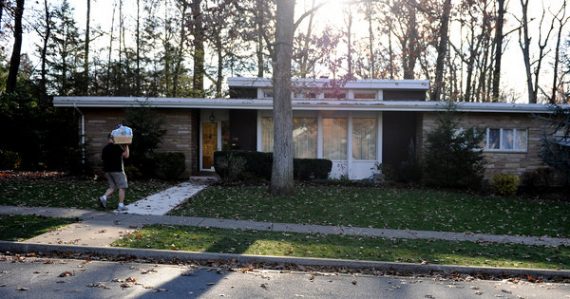Paterno Sold Wife House for $1
Joe Paterno recently sold his share of their house to his wife for $1, presumably to shield it from legal settlements.
Joe Paterno recently sold his share of their house to his wife for $1.
NYT (“Paterno Passed On Home to His Wife for $1“):
Joe Paterno transferred full ownership of his house to his wife, Sue, for $1 in July, less than four months before a sexual abuse scandal engulfed his Penn State football program and the university.
Documents filed in Centre County, Pa., show that on July 21, Paterno’s house near campus was turned over to “Suzanne P. Paterno, trustee” for a dollar plus “love and affection.” The couple had previously held joint ownership of the house, which they bought in 1969 for $58,000.
According to documents filed with the county, the house’s fair-market value was listed at $594,484.40. Wick Sollers, a lawyer for Paterno, said in an e-mail that the Paternos had been engaged in a “multiyear estate planning program,” and the transfer “was simply one element of that plan.” He said it had nothing to do with the scandal.
Paterno, who was fired as the football coach at the university last week, has been judged harshly by many for failing to take more aggressive action when he learned of a suspected sexual assault of a child by one of his former top assistants.
Some legal experts, in trying to gauge the legal exposure of the university and its top officials to lawsuits brought by suspected victims of the assistant, Jerry Sandusky, have theorized that Paterno could be a target of civil actions. On Nov. 5, Sandusky, Penn State’s former defensive coordinator, was charged with 40 counts related to the reported sexual abuse of eight boys over 15 years. Paterno, 84, was among those called to give testimony before a grand jury during the investigation, which began in 2009.
Experts in estate planning and tax law, in interviews, cautioned that it would be hard to determine the Paternos’ motivation simply from the available documents. It appears the family house had been the subject of years of complex and confusing transactions.
Lawrence A. Frolik, a law professor at the University of Pittsburgh who specializes in elder law, said that he had “never heard” of a husband selling his share of a house for $1 to his spouse for tax or government assistance purposes.
“I can’t see any tax advantages,” Frolik said. “If someone told me that, my reaction would be, ‘Are they hoping to shield assets in case if there’s personal liability?’ ” He added, “It sounds like an attempt to avoid personal liability in having assets in his wife’s name.”
Two lawyers examined the available documents in recent days. Neither wanted to be identified because they were not directly involved in the case or the property transaction. One of the experts said it appeared to be an explicit effort to financially shield Joe Paterno. The other regarded the July transaction, at least on its face, as benign.
It’s hard to imagine a purpose for this–especially given the timing (he’d testified to the grand jury months before the indictments were handed down ten days ago)–other than shielding his assets. Which, frankly, is a perfectly prudent action under the circumstances.
As an aside, it’s remarkable that the Paternos are still living in the same modest house they bought in 1969. While his $513,000 annual salary is modest by big time college coach standards, it’s certainly more than enough to support a more lavish lifestyle.







A couple thoughts on this:
First, if the house was originally titled in both Paterno’s name and his wife’s name then I’m not sure why they would do this. I don’t know PA law, but in most states when property is titled jointly in both spouses names then it is immune from being touched by creditors unless they have a claim against both the husband and the wife. If this really was an asset protection move, it makes no sense for that reason. Of course, PA law could be different, which would make this point moot.
Second, the fact that it’s titled “Suzanne Paterno, trustee” tells me that the property was transferred into a trust of some kind. This is often done as an estate planning move even by people of relatively modest means.
Third, I have been thinking about this Paterno liability issue and I’ve got to wonder if there isn’t an insurance policy or three out there that is likely to cover claims against Paterno. I find it hard to believe that one of the most famous football coaches in the country wasn’t covered by a liability policy of some kind, either personal or provided as a result of employment.
So, there may be a perfectly innocent explanation for this. However, if someone does end up getting judgment(s) against Paterno at some point in the future, I’m sure this transaction will be scrutinized.
As for the final point, in my travels through that part of PA I haven’t seen many luxury homes to begin with.
1. Was this just an estate planning move?
2. that 1/2 mil is considered average is actually part of another problem.
In what sense is a house that has a market value of over half a million dollars and sold in ’69 for just under $60,000 modest? One of my great mistakes coming out of college was failing to buy a house in a pricier suburb of Seattle near the lake for what I thought at the time was an outrageous price–$29,900. That was 1975. My regret came from having realtor show me the same house a few years later for $75,000.
Outside the Beltway (not really any more) strikes again with another example of how out of touch the bloggers are. No wonder you don’t get OWS.
James,
State College is a fairly cheap area for housing, as it is a long way from Philly or Pittsburgh. A house worth over $50,000 in the late 1960’s and over $500,000 today in Centre County is likely one of the largest in the County. By way of camparison, my parents bought what was then a large house (4 bedrooms, 2 1/2 baths) in Northeast Philly at the same time, for $22,900.
(When I said “1/2 mil” I was speaking of the income, rather than the house value.)
I think living in a small house quite close to campus was part of the mythology. Besides, even twenty years ago there was no sense in Paterno buying a bigger house just to not use the floors he couldn’t reach and complain about how hard it was to heat and air condition.
@Doug Mataconis: According to these Pennsylavnia lawyers, Pennsylvania does recognize the right of spouses to own property that is immune from creditors of one spouse. I’d guess this is some form of estate planning.
@Just nutha ig’rant cracker: I’m going by the photo as much as the price. It looks to be the sort of house that a junior college professor would buy as a starter home, not one owned by one of the most famous football coaches in the country. Most of Paterno’s contemporaries are making upwards of $3 million; still, even $500k is a hell of a lot of money.
@James Joyner:
Tie that to youth unemployment, I dare you.
@john personna: If there’s a relationship, it’s so tangential as to be microscopic. Football programs bring in a boatload of money from TV and sponsorships and plow a lot of it back into running the programs. A handful of the top coaches make $5-6 million. But they’re not being paid by the universities themselves, much less out of state budgets.
Short of divorce or Joe Pat dying I don’t see a lot of liability reduction here.
I’m no lawyer but like Doug, I can’t be sure.
That house is beginning to look old. I like the contemporary style, but the mural stone is showing its age (out of date). I’ve been looking at houses lately and you cannot believe the old styles inside. Flower wall paper, small kitchens, old bathrooms, etc. Anyone in their 80’s and living in the same house for all those years, you know you will have to renovate. Add another $100,000 to fix it up.
That house is pretty typical of what you see in Pennsylvania and Ohio among houses built in that era, to be honest.
I think that the “500K” thing is a misnomer; that’s the appraised value for taxes. A house that someone is never going to sell isn’t worth anything. A house that the Paterno family lived in for some 40 or 50 years is going to be worth next to nothing if things get any worse. Before this scandal, I’m sure that there was an idea out there to turn it into some sort of shrine or something to that effect. Paterno walked back and forth to work every day when he was healthy enough to do so, or so I have heard.
In any event, we cannot see the back of the house; perhaps they stuck a lot of money into additions and improvements and did so in a modest way.
@James Joyner: Yes, but some are considered state employees; a coach making several million dollars a year is often the highest paid state employee in any given state where this arrangement exists.
Joe Paterno’s compensation is over a million dollars per year.
@Warren Jason Street:
Living in Ohio, maybe that house has value for being on or near campus, but in my town, a 2000 sq. ft. house would be worth around $120,000 plus whatever you renovate. In a bigger Midwest city, maybe $200,000 to $300,000. The economy is bad in the Midwest and you can bring down the price. The newer houses in newly built areas with some 3000 sq. ft. are $350,000 and up.
What was new when I was growing up is really a shock today. But as you say, maybe they improved it already. Hard to say. I am in the process of buying a condo, and don’t want the headaches of a house. Everything I looked at looked like crap. In the end, the condo overlooks a lake. I will have a million dollar view for less than anyone can imagine. But this is in a town with factories closed. It makes no difference to me, as I am not looking for a job and I plan on having it till I die.
He gave it to a trust. “to wife, trustee.” In PA, if you gift real property, you either have to put the appraised value or use some nominal value – typically $1. This was probably a qualified personal residence trust.
@James Joyner:
I think the article I linked above shows that “big sports” actually bite college performance two ways. First, most schools do not turn a sports profit. I’m not sure Penn even does, all told. Second, it dilutes the mission. A certain amount of “spirit” is no doubt good, but it can also be another reason to forget why you are there.
Remember when you’d do those posts lambasting college as “career training?”
Well, how’s that under-30 unemployment doing?
@john personna: Basically, only football and men’s basketball can even potentially make money. (There are maybe five or six women’s basketball programs and one or two women’s soccer programs that make money.) And the level of competition is such that they spend enormous sums on salaries, travel, promotion, and whatnot. So even programs like Auburn–which won the national championship in football last season–technically lose money.
I think that Joe is protecting an asset he feels he might lose in law suits.